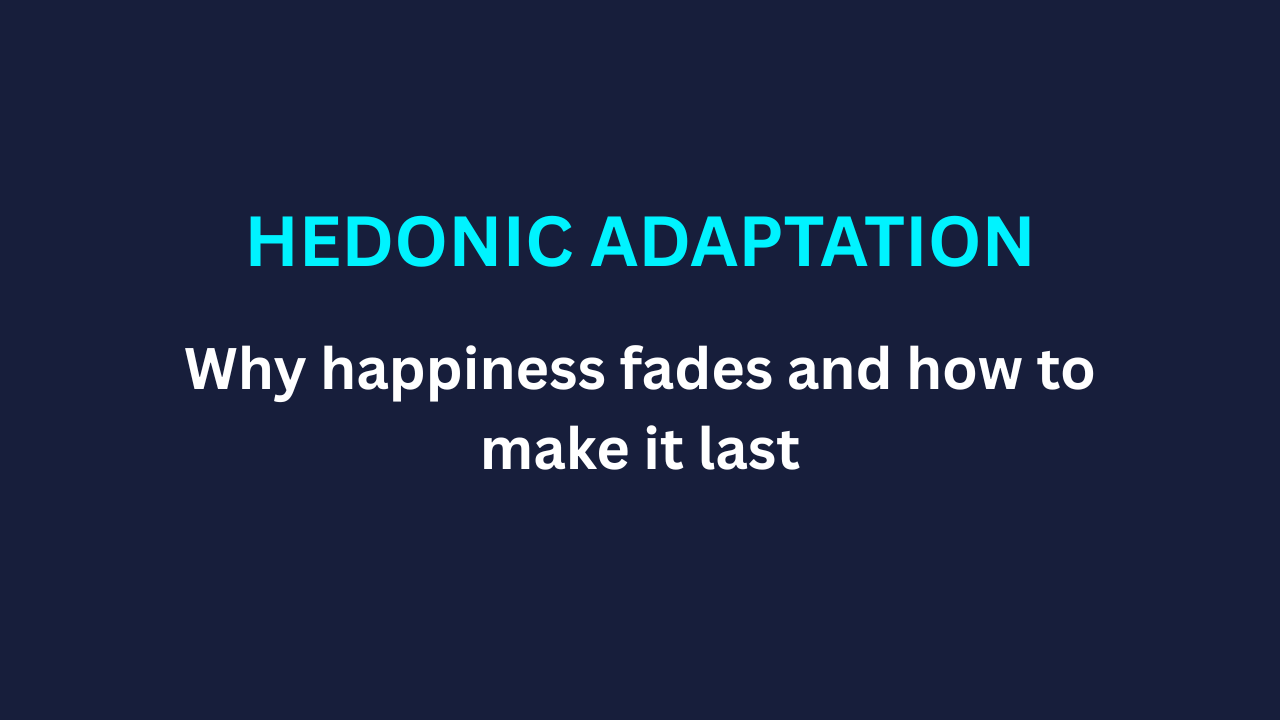
Hedonic Adaptation — Why Happiness Fades and How to Make It Last
You’ve achieved the goal, landed the job, bought the car, or reached the milestone. For a fleeting moment, happiness floods your system — but then, almost without notice, it fades. What felt extraordinary becomes ordinary. What was once a peak becomes your new baseline.
This phenomenon is known as Hedonic Adaptation, the psychological tendency to return to a stable level of happiness despite significant positive or negative changes in life.
If you’ve ever wondered why success feels empty after the initial high, or why chasing more never seems to satisfy, Hedonic Adaptation is the reason. And unless you actively counteract it, you’ll remain trapped in a cycle of achieving yet never truly feeling fulfilled.
In this post, we’ll explore the science behind Hedonic Adaptation and how Psychosomatic Intelligence (PSI) provides tools to break the adaptation loop — allowing happiness and fulfillment to deepen over time instead of fading away.
The Science of Hedonic Adaptation
Psychologists Brickman and Campbell first described the "hedonic treadmill" in 1971. It suggests that people quickly return to a relatively stable level of happiness regardless of life changes. Neuroscience has since backed this with findings that the brain’s reward system adapts to repeated stimuli — what once triggered high dopamine responses loses its impact with familiarity.
For example, the excitement of a new car or promotion fades as the brain normalizes it, reducing dopamine responses and emotional novelty. This is why continual achievement without psychological and physiological integration leads to a hollow sense of success.
The Hidden Cost of Adaptation
Unchecked, Hedonic Adaptation can result in:
-
A perpetual feeling of "not enough"
-
Burnout from constantly chasing new highs
-
Emotional flatlining where nothing excites you
-
Chronic dissatisfaction despite outward success
This is where many high-achievers falter — not from lack of achievement, but from lack of sustained emotional connection to their success.
How PSI Breaks the Adaptation Cycle
Psychosomatic Intelligence (PSI) offers a multi-layered approach to not just achieve more, but to feel more deeply connected to your success — ensuring your progress is accompanied by lasting satisfaction and internal growth.
-
Emotional Amplification Practices Instead of moving quickly to the next goal, PSI teaches you to amplify the emotional reward of success. Practices like gratitude journaling, embodied celebration, and heart coherence breathing help lock in positive emotions associated with your achievements. This strengthens synaptic connections in the brain’s reward centers, making it easier to recall and re-experience those positive emotions later, rather than letting them fade.
-
Somatic Integration Success often registers mentally but not somatically. Through breathwork, conscious movement, and vagus nerve stimulation, PSI ensures that your body feels the success, not just your mind. This embodied integration increases your baseline happiness by creating visceral memories of fulfillment that your nervous system can access again and again.
-
NeuroGoal Reflection Revisiting your NeuroGoal Sequence after achieving a milestone helps reactivate the emotional and physiological state you were in when you first set the goal. This process of re-engagement helps you savor the win, strengthens your emotional memory of the achievement, and primes your system for sustained motivation without needing the next dopamine hit.
-
Progressive Identity Evolution PSI turns each success into an opportunity for evolving your identity. Instead of defining yourself by temporary outcomes, you develop a fluid self-concept that aligns with continuous growth and mastery. This prevents stagnation because your fulfillment no longer depends on a singular achievement — it’s woven into who you are becoming with each step forward. With PSI, each achievement becomes a stepping stone for identity evolution. You’re not just someone who achieved a goal — you become a person who consistently lives aligned with growth, purpose, and presence.
A Life Beyond the Treadmill
Escaping the hedonic treadmill doesn't require giving up on your ambitions — it requires transforming your relationship with progress. With PSI, the journey itself becomes a source of satisfaction, not just the end result.
Instead of chasing one fleeting high after another, you:
-
Sustain emotional highs through embodiment, making achievements a full-bodied experience, not just a mental checkmark.
-
Cultivate gratitude and presence consistently, turning each moment into an opportunity for appreciation and emotional richness.
-
Develop a nervous system that feels safe in success, so you're not subconsciously pulling back or self-sabotaging after a win.
-
Anchor your identity in growth, not outcomes, ensuring that every goal adds to your sense of self rather than replacing it.
This creates a life where success isn't just a series of peaks followed by valleys — it's a steadily rising foundation of purpose, joy, and personal coherence. A life where happiness compounds instead of fading, and where your achievements are stepping stones in an ever-evolving journey of fulfillment.
Want to learn how to make your success last — emotionally, mentally, and physically? 👉 Schedule a free strategy call

